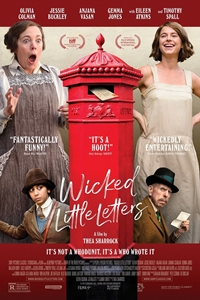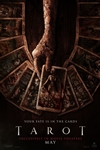Wicked Little Letters (R) ★★½
 As a comedy, Wicked Little Letters hits many of the right notes, although the satirical elements are often presented too bluntly to lacerate with maximum effect. As a mystery, however, it is less than impressive. The whodunnit? aspect is revealed quite early (and isn't hard to guess) and the investigation is plodding and uninvolving. Ultimately, more heavy lifting is done by the actors - especially Jessie Buckley and Olivia Colman - than the screenplay. They're up to the task but even their efforts can only elevate the material so far. It feels a lot like one of those middle-of-the-road art house films from the 1990s.
As a comedy, Wicked Little Letters hits many of the right notes, although the satirical elements are often presented too bluntly to lacerate with maximum effect. As a mystery, however, it is less than impressive. The whodunnit? aspect is revealed quite early (and isn't hard to guess) and the investigation is plodding and uninvolving. Ultimately, more heavy lifting is done by the actors - especially Jessie Buckley and Olivia Colman - than the screenplay. They're up to the task but even their efforts can only elevate the material so far. It feels a lot like one of those middle-of-the-road art house films from the 1990s.
The story transpires in post-WWI rural England and focuses on next-door neighbors Edith Swan (Olivia Colman), a middle-age unmarried Christian who lives with her parents, and Rose Gooding (Jessie Buckley), a war widow with a young daughter and a penchant for profane tirades. The unlikely friendship between the two very different women is sundered when Child Protective Services call on Rose to check on the well-being of Nancy (Alisha Weir); Rose suspects Edith of having reported her as an unfit mother. Shortly thereafter, Edith receives the first of many “wicked little letters” - anonymous, hateful missives full of vulgar insults. Edith's domineering father, Edward (Timothy Spall), demands action from the local police - Constable Papperwick (Hugh Skinner), Chief Constable Spedding (Paul Chahidi), and Woman Police Officer Gladys Moss (Anjana Vasan). Although Gladys thinks the charges are ludicrous, Spedding and Papperwick arrest Rose on suspicion of having sent the letters based on nothing more than Edward's unfounded accusation and Edith's reluctant testimony.
Wicked Little Letters is as interested in skewering early 20th century morality as it is in telling an interesting story. Papperwick and Spedding are caricatures. Edward has no redeeming qualities. Anyone with liberal ideals is lionized. After a while, this gets in the way of story development and pretty much gives away the “mystery” long before it is explicitly revealed. The movie takes the approach that anyone holding Christian beliefs is a hypocrite and anyone embracing progressive viewpoints related to feminism is heroic. Although Jonny Sweet's screenplay scores some points and generates a few laughs, it loses sight of the characters along the way.
The two central figures, Edith and Rose, are sufficiently fascinating to justify the movie. Edith, a sad figure warped by her domineering father, has given up her own hopes of marriage and motherhood. Rose's freedom from the shackles of convention is seductive but she lacks the backbone to yield to it. Lead actresses Olivia Colman and Jessie Buckley (who previously collaborated by playing the same character during different time frames in Maggie Gyllenhaal's The Lost Daughter) give intense, committed performances that imbue their characters with greater humanity than what's apparent in the writing. Buckley in particular shines; Rose's cocky, take-no-shit attitude is a breath of fresh air whooshing through the town's conservative stuffiness. The third main character, Anjana Vasan's Police Officer Gladys Moss, is sadly one-dimensional. All we know about her is that she joined the police force to honor her late father and she's viewed as being a subordinate to her male co-workers. They are stupid and preening; she is smart, motivated, and self-effacing.
Director Thea Sharrock has made a Valentine to female empowerment and freedom of expression during an age characterized chauvinism and misogyny. And, when it comes to the title objects, we're reminded of the timelessness and universality of anonymous hatred. Today, it's Social Media. Yesterday, it was e-mail. Last century, it was letters. The performances of Buckley and Colman rescue much of what's salvageable in the narrative and there's some interest in how the truth will be revealed but the movie isn't as funny as it need to be for the satirical elements to work.
© 2024 James Berardinelli
To get the full Quicklook Films experience, uncheck "Enable on this Site" from Adblock Plus
box office top 10

The Fall Guy Released: May 3, 2024 Cast: Ryan Gosling, Emily Blunt 28.5M

Star Wars Episode 1 The Phantom Menace 25th Anniversary Released: May 3, 2024 Cast: Ewan McGregor, Liam Neeson 8.1M

Challengers Released: April 26, 2024 Cast: Zendaya, Josh O'Connor 7.6M

Tarot Released: May 3, 2024 Cast: Harriet Slater, Adain Bradley 6.5M

Godzilla x Kong: The New Empire Released: March 29, 2024 Cast: Rebecca Hall, Brian Tyree Henry 4.5M

Civil War Released: April 12, 2024 Cast: Kirsten Dunst, Wagner Moura 3.6M

Unsung Hero Released: April 26, 2024 Cast: Daisy Betts, Joel Smallbone 3M

Kung Fu Panda 4 Released: March 8, 2024 Cast: Jack Black, Awkwafina 2.4M

Abigail Released: April 19, 2024 Cast: Melissa Barrera, Dan Stevens 2.3M

Ghostbusters: Frozen Empire Released: March 22, 2024 Cast: Paul Rudd, Carrie Coon 1.8M






